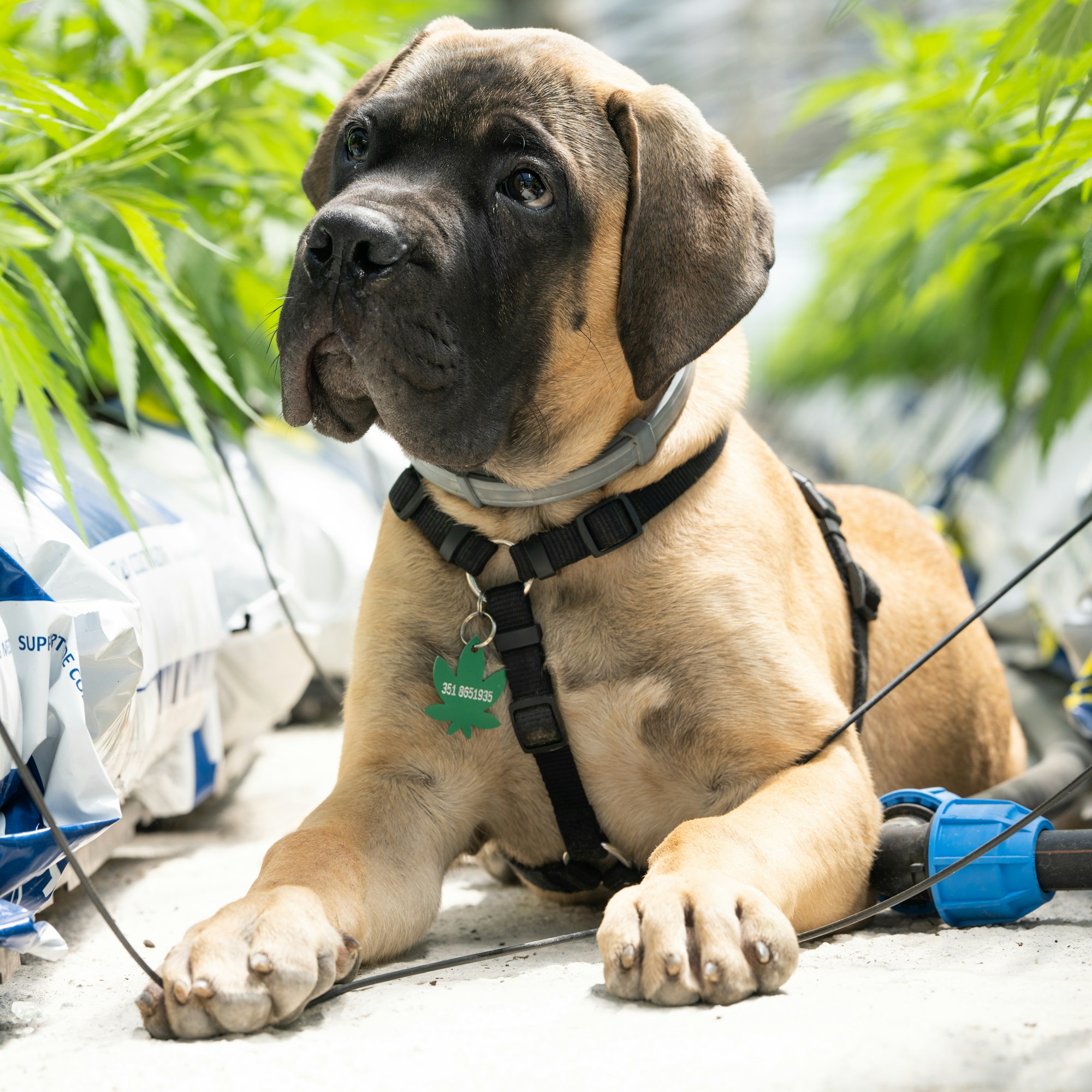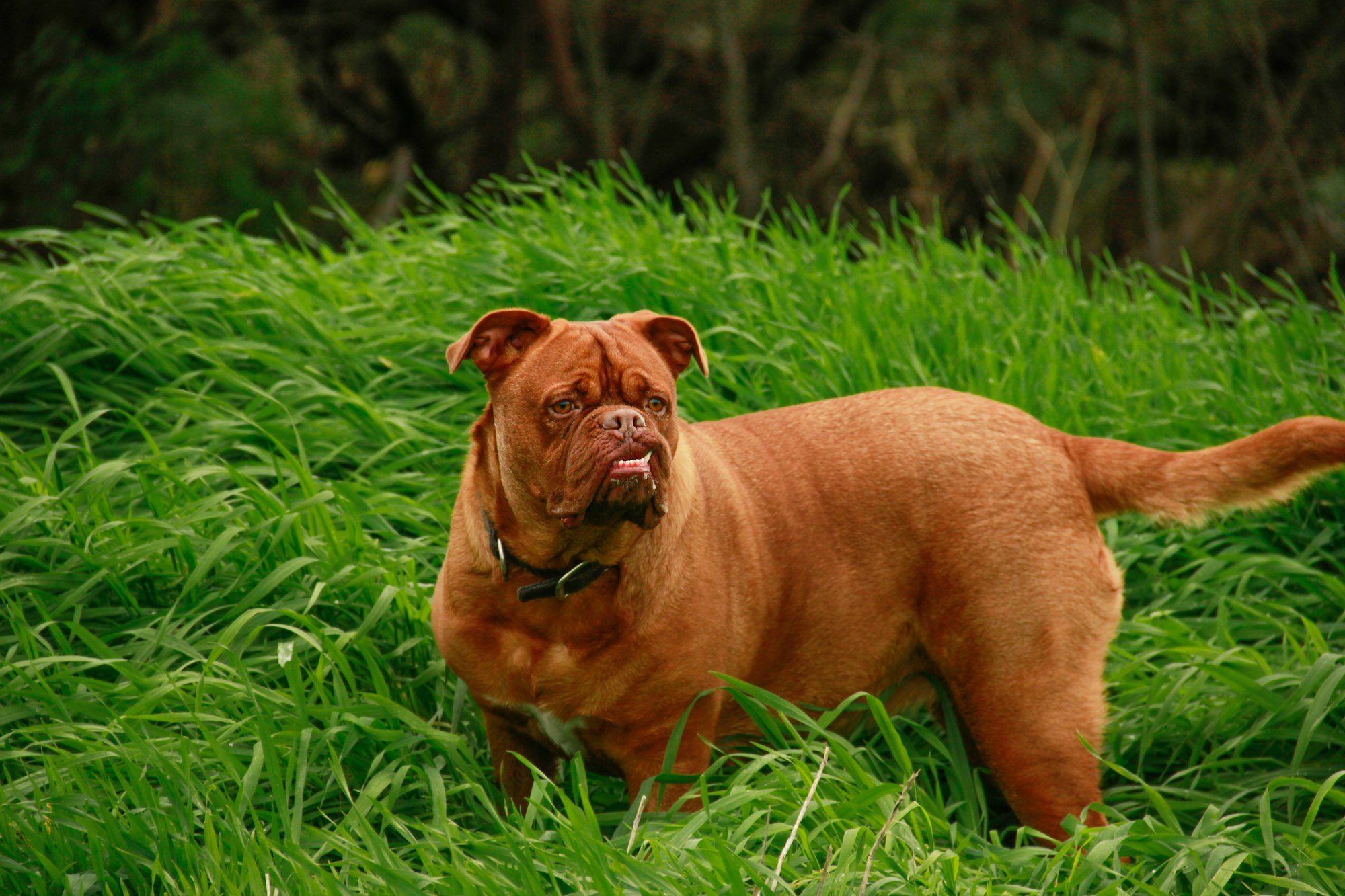The English Mastiff, a true gentle giant, commands attention with its imposing size and affectionate nature. This magnificent breed has captured the hearts of dog enthusiasts worldwide, earning a reputation for its loyalty, calm demeanor, and protective instincts. In this comprehensive guide, we'll delve into the captivating world of the English Mastiff, exploring its historical background, physical characteristics, temperament, exercise requirements, grooming essentials, training considerations, common health concerns, social interactions, and more.

English Mastiff Introduction
The English Mastiff, often referred to simply as the Mastiff, is a breed of remarkable stature and endearing temperament. Despite its imposing presence, this breed is known for its gentle and affectionate nature, making it a cherished companion and a loyal family member.
Historical Origins and Legacy
Originating in ancient times, the English Mastiff has a rich history intertwined with human civilization. Bred for guarding, hunting, and companionship, this breed has evolved over centuries, leaving an indelible mark on the world of canines.
Physical Traits: A Closer Look at the English Mastiff
The physical attributes of the English Mastiff contribute to its majestic appearance. Here's an in-depth exploration of the features that define this breed:
- Impressive Size: With a massive build, English Mastiffs often stand as one of the largest dog breeds, embodying strength and power.
- Distinctive Head: The breed's head is broad and square, adorned with a short, dark muzzle and expressive eyes that reflect their gentle nature.
- Muscular Frame: Beneath their loose, wrinkled skin lies a strong and muscular body that underscores their remarkable physical presence.
- Coat and Color: English Mastiffs sport a short, smooth coat that can come in various dog coat colors, including fawn, apricot, and brindle, enhancing their regal appearance.
- Signature Tail: Their tail is long and tapers to a fine point, adding to the breed's elegance and overall balance.
Weight and Height of the English Mastiff
The English Mastiff is renowned for its impressive size and commanding presence. Here's a closer look at their typical weight and height range:
Weight:
- Adult Male English Mastiffs typically weigh between 160 to 230 pounds (73 to 104 kg).
- Adult Female English Mastiffs generally weigh around 120 to 170 pounds (54 to 77 kg).
Height:
- Adult Male English Mastiffs stand approximately 30 to 34 inches (76 to 86 cm) tall at the shoulder.
- Adult Female English Mastiffs have a similar height range, typically around 27.5 to 32 inches (70 to 81 cm).
These weight and height ranges emphasize the English Mastiff's substantial build and muscular stature. Their sheer size, combined with their gentle and protective temperament, makes them a distinctive and cherished breed.
The English Mastiff's Gentle and Protective Temperament

Beneath their imposing exterior, English Mastiffs possess a heartwarming temperament that endears them to families. Here's an exploration of their unique personality traits:
- Gentle Demeanor: Despite their size, English Mastiffs are known for their gentle and affectionate nature, often seeking close companionship with their human family.
- Protective Instincts: With a strong protective instinct, English Mastiffs are natural guardians who will stand watch over their loved ones and territory.
- Loyal Devotion: English Mastiffs form strong bonds with their family members and exhibit unwavering loyalty and dedication.
- Calm and Relaxed: While they have a commanding presence, English Mastiffs tend to have a calm and relaxed demeanor, making them well-suited for indoor living.
- Excellent with Children: Their patient and tolerant nature makes them wonderful companions for children, often assuming the role of a gentle and watchful friend.
Exercise and Activity: Balancing the Mighty Build
Maintaining the physical well-being of an English Mastiff involves a balanced approach to exercise and activity. Here's a guide to meeting their needs:
- Moderate Exercise: English Mastiffs benefit from regular, moderate exercise to keep them fit and prevent weight gain. Daily walks and play sessions are recommended.
- Mind Stimulation: Engage their intelligent minds with puzzle toys, interactive games, and training sessions to prevent boredom.
- Gentle Play: Due to their size, avoid strenuous activities that may strain their joints. Gentle play and controlled exercise are key.
- Consistent Routine: Establish a consistent daily routine that includes exercise, meals, and rest to promote their overall well-being.
- Puppy Care: Pay special attention to exercise and play for growing Mastiff puppies to ensure healthy development.
Grooming and Coat Care: Nurturing the Magnificent Coat
Caring for the English Mastiff's coat involves regular grooming to maintain their hygiene and appearance. Here's a stepwise approach to grooming:
- Brushing: While their coat is short, regular brushing helps remove loose hair and keeps their skin healthy.
- Wrinkle Care: Pay attention to the wrinkles on their face and neck, ensuring they remain clean and dry to prevent skin irritations.
- Ear Cleaning: Clean their ears regularly to prevent moisture buildup and potential infections.
- Nail Trimming: Trim their nails as needed to prevent overgrowth and discomfort.
- Dental Care: Regular dental hygiene, including teeth brushing, can help prevent dental issues.
Training Your English Mastiff: Harnessing Strength with Obedience
Training an English Mastiff is a rewarding endeavor that harnesses their intelligence and strength. Here are steps to successful training:
- Positive Reinforcement: Use positive reinforcement techniques such as treats, praise, and interactive dog toys to reward desired behaviors.
- Early Socialization: Expose your Mastiff puppy to various people, dogs, and environments from a young age to ensure confident and well-adjusted behavior.
- Basic Commands: Teach essential commands like sit, stay, come, and leash manners to ensure a well-behaved companion.
- Leash Training: Given their size and strength, leash training is crucial to ensure safe and controlled walks.
- Gentle Handling: Use gentle and patient methods, as English Mastiffs respond best to positive and respectful training approaches.
Health Concerns in English Mastiffs
While English Mastiffs are known for their gentle nature and majestic presence, like all breeds, they can be susceptible to certain health issues. Responsible ownership, regular veterinary care, and preventive measures can help ensure a happy and healthy life for your beloved Mastiff. Here are some common health considerations for English Mastiffs:
- Hip Dysplasia: This hereditary condition affects the hip joints and can lead to pain and mobility issues. Regular exercise, maintaining a healthy weight, and joint supplements may help mitigate the impact of hip dysplasia.
- Gastric Dilatation-Volvulus (GDV), or Bloat: Large and deep-chested breeds like English Mastiffs are prone to bloat, a life-threatening condition where the stomach twists and traps gas. Feeding smaller, frequent meals and avoiding vigorous exercise after eating can help reduce the risk.
- Cardiac Issues: Dilated cardiomyopathy, a heart condition, can affect English Mastiffs. Regular veterinary check-ups and a heart-healthy diet can contribute to their cardiac well-being.
- Joint Problems: Beyond hip dysplasia, English Mastiffs may also experience other joint issues such as elbow dysplasia and cruciate ligament injuries. Joint supplements and controlled exercise can help support joint health.
- Eye Conditions: Progressive retinal atrophy (PRA) and cataracts are eye issues that can impact Mastiffs' vision. Regular eye exams can help detect and manage these conditions.
- Skin Problems: Mastiffs are prone to skin conditions such as allergies and dermatitis. Regular grooming, proper hygiene, and a balanced diet can help prevent skin issues.
- Obesity: Due to their large size, English Mastiffs are at risk of obesity, which can exacerbate other health concerns. Monitoring their diet and providing regular exercise is essential.
- Respiratory Issues: Brachycephalic syndrome, characterized by breathing difficulties due to their short muzzle, can affect English Mastiffs. Avoid strenuous exercise in hot weather and ensure they have a cool and well-ventilated environment.
- Cancer: Like many breeds, English Mastiffs can be susceptible to certain types of cancer. Early detection and regular veterinary check-ups are crucial for early intervention.
- Growth-related Concerns: Given their rapid growth, Mastiff puppies are prone to issues such as panosteitis (growing pains) and hypertrophic osteodystrophy (HOD). Providing proper nutrition and avoiding excessive exercise during growth stages can help minimize these concerns.
It's important for English Mastiff owners to be vigilant and proactive about their dog's health. Regular veterinary check-ups, a balanced diet, controlled exercise, and attention to their overall well-being can help mitigate the impact of potential health issues and ensure a long and happy life for your furry companion.

Socializing Your English Mastiff: Nurturing Canine Connections
Socialization is a critical aspect of raising a well-adjusted English Mastiff. Here's a guide to fostering positive social interactions:
- Early Exposure: Begin socializing your Mastiff puppy from a young age, gradually introducing them to various people, animals, and environments.
- Positive Encounters: Ensure that social interactions are positive and rewarding, using treats and praise to reinforce good behavior.
- Doggy Playdates: Arrange playdates with well-mannered dogs to promote healthy social interactions and play skills.
- Public Outings: Take your Mastiff to different places, such as parks, pet-friendly stores, and events, to expose them to various stimuli.
- Training Classes: Enroll your Mastiff in puppy or basic obedience classes to enhance their social skills and obedience training.
English Mastiffs as Loyal Family Companions
The English Mastiff's affectionate and protective nature makes them exceptional family companions. Here's a closer look at their role within the family:
- Family Guardian: English Mastiffs' protective instincts make them excellent guardians who will watch over their family and home.
- Gentle Nature: Despite their imposing appearance, English Mastiffs have a gentle and patient demeanor, especially with children.
- Affectionate Bond: They form strong bonds with their family members and thrive on close companionship.
- Indoor Comfort: While they enjoy outdoor activities, English Mastiffs are content to spend time indoors with their loved ones.
- Emotional Support: Their calming presence and affectionate nature make them wonderful emotional support animals.
Debunking Common Misconceptions about English Mastiffs
Dispelling myths about English Mastiffs helps paint an accurate picture of this remarkable breed. Here's a stepwise exploration of common misconceptions:
- Aggressiveness: English Mastiffs are not inherently aggressive; they are known for their gentle and protective nature.
- Exercise Demands: While they have moderate exercise needs, English Mastiffs are not as high-energy as some smaller breeds.
- Living Space: Despite their size, English Mastiffs can adapt well to apartment living, provided they receive sufficient exercise and companionship.
- Training Challenges: English Mastiffs are intelligent and responsive to training, especially with positive reinforcement methods.
- Lifespan: With proper care, English Mastiffs can live around 8 to 10 years, which is in line with the average lifespan of larger breeds.
Average Price of an English Mastiff
Acquiring an English Mastiff involves a financial commitment due to their size, care needs, and potential health considerations. The cost of an English Mastiff can vary significantly based on factors such as breeder reputation, lineage, location, and whether the dog is intended for show or pet purposes. On average, you can expect to pay between $1,500 to $3,500 for an English Mastiff puppy from a reputable breeder.
It's important to note that the initial purchase price is just one aspect of the expenses associated with owning an English Mastiff. Additional costs may include veterinary care, dog food, grooming, training, and potential medical bills. Responsible ownership also involves providing a suitable living environment and ensuring the well-being of your canine companion.
When considering adding an English Mastiff to your family, it's recommended to research and connect with reputable breeders who prioritize the health and welfare of their dogs. Alternatively, adopting from shelters or rescue organizations can provide a loving home to a Mastiff in need while also being a more cost-effective option.
Remember that investing in a well-bred and healthy English Mastiff can lead to a rewarding and enriching relationship with this majestic and gentle giant.
Conclusion
In conclusion, the English Mastiff stands as a magnificent and gentle breed, embodying strength, loyalty, and unwavering devotion. From its historical legacy to its loving temperament, the English Mastiff continues to captivate and enrich the lives of those fortunate enough to share their journey.
FAQs
1. Are English Mastiffs good with children?
Yes, English Mastiffs are known for their gentle and patient nature, making them great companions for children.
2. Do they require a large living space?
While they appreciate space, English Mastiffs can adapt to apartment living with proper exercise and companionship.
3. Are English Mastiffs prone to aggressive behavior?
No, English Mastiffs are protective but not inherently aggressive. Early socialization and training are key to well-behaved behavior.
4. Do they have special dietary requirements?
Due to their size, English Mastiffs may have unique nutritional needs. Consult a veterinarian for a balanced diet.
5. How do I find a reputable breeder?
Look for breeders who prioritize health, temperament, and responsible breeding practices. Adoption from shelters and rescue organizations is also a wonderful option.

